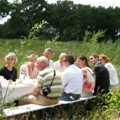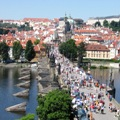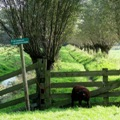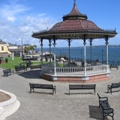 |
 |
 |
 |
 |

|
Governance issues in rural development Setting the sceneAfter the outbreak of swine fever in 1997, the government decided on a major reorganisation of rural areas in southern and eastern Netherlands. This is enshrined in the Reconstruction Act of 2002, with provincial authorities receiving the director's role for the implementation of major changes. Persistent environmental problems from the last century, such as acidification, eutrophication and desiccation, had learned that complex problems could not only be solved sectorally or by public bodies. Therefore, the Province of Noord-Brabant has chosen a different approach. It has divided the provincial area into nine regions and commissioned a committee for each region to develop a strategic plan in close cooperation with all stakeholders. This planning started in 2001 and has been completed in 2004 with the approval of the area plans. Implementation of the plans would run from 2005 to 2016. Challenge for change
Mode of operationInteractive Consult was asked to develop the learning program. Two pilots, Area brokerage and Regional branding, provided the input. These practical cases made it more easy to demonstrate the aims of the learning programme and enabled the project team to interest parties to participate. This resulted in the programme Directing Sustainable Rural Development (SDPO). The core of the programme was the support to a number of selected, innovative pilots ('leading areas'). These would provide the experience and difficulties in rural development, that would be discussed and resolved in knowledge circles, in which practitioners, policy officers and scientists would participate. The collection and exchange of experiences and putting issues and opportunities on the political agenda would be organised by an external knowledge hub. The programme was launched late 2005 and completed in 2007. The business plan for the knowledge hub was also a project by Interactive Consult, resulting in Regiowaarde. More information
|
|
 The chosen approach of Brabant is a shift from vertical to horizontal directing (from 'government' to 'governance'). At the start of the planning process no concepts were available for organising and directing the implementation of the so called reconstruction of the countryside. That is where the idea for a learning curve originated. On the initiative of the Province of Noord-Brabant, the Association of Provincial Authorities (IPO) commissioned the development of a case-based programme, co-financed by the Ministry of Agriculture and the programme Learning for Sustainable Development. Based on practical experience, joint committees, coordinators, policy officers and politicians would be facilitated to learn how a sustainable development of the countryside could be enhanced.
The chosen approach of Brabant is a shift from vertical to horizontal directing (from 'government' to 'governance'). At the start of the planning process no concepts were available for organising and directing the implementation of the so called reconstruction of the countryside. That is where the idea for a learning curve originated. On the initiative of the Province of Noord-Brabant, the Association of Provincial Authorities (IPO) commissioned the development of a case-based programme, co-financed by the Ministry of Agriculture and the programme Learning for Sustainable Development. Based on practical experience, joint committees, coordinators, policy officers and politicians would be facilitated to learn how a sustainable development of the countryside could be enhanced.